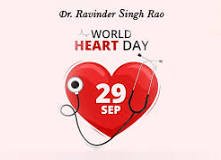Every September 29, (Today, Sunday, September 29) marks World Heart Day. It is a global initiative to raise awareness about cardiovascular disease (CVD) and promote heart-healthy habits.
As the world’s leading cause of death, claiming 17.3 million lives annually, CVD is a pressing concern that demands attention and action In Nigeria, the statistics are alarming, with heart disease responsible for 11% of all deaths.
Korede Abdullah, Southwest correspondent of Africa Health Report, evaluates the rampant issues of heart and related health conditions blighting ambitions, careers of millions of people in the world. And, the significance of World Heart Day, the critical role of enlightening the Nigerian citizens on how to promote healthy lifestyles.
Essence of World Heart Day
World Heart Day, observed annually on September 29, is a global awareness campaign advocating for cardiovascular health and well-being. Launched in 2000 by the World Heart Federation (WHF).
World Heart Day has its roots in 1999 when the World Heart Federation (WHF) partnered with the World Health Organization (WHO) to launch this critical initiative. Initially observed on the last Sunday of September, the date was standardized to September 29 in 2011 to enhance global visibility.
The initiative aims to educate individuals, families, and communities about the risks and consequences of heart disease and stroke, while promoting preventive measures and healthy lifestyle choices.
The day serves as a rallying cry for governments, healthcare professionals, and the general public to unite against cardiovascular disease (CVD), the world’s leading cause of death, claiming over 18.6 million lives each year.
Through World Heart Day, the WHF emphasizes the importance of adopting simple yet effective habits to reduce the risk of CVD. These include engaging in regular physical activity, eating a balanced diet, avoiding tobacco, managing stress, and monitoring blood pressure and cholesterol levels.
The campaign also seeks to dispel common myths and misconceptions surrounding heart disease, highlighting that 80% of premature deaths from CVD can be avoided through timely interventions and lifestyle modifications.
2024 Theme: Use Heart for Action
The World Heart Day campaign, running from 2024 to 2026, adopts the theme “Use Heart for Action.” This rallying cry urges individuals to take charge of their heart health while demanding policymakers prioritize cardiovascular well-being. The initiative seeks to transition from mere awareness-raising to empowering individuals with actionable objectives.
At its core, “Use Heart for Action” embodies a dual approach: influencing policy changes and promoting behavioural shifts, physical activity, and sustained collaboration. By working together, we can reduce the global burden of heart disease.
Cardiovascular diseases (CVDs) encompass various heart and blood vessel disorders. These include coronary heart disease, cerebrovascular disease, peripheral arterial disease, rheumatic heart disease, congenital heart disease, deep vein thrombosis, and pulmonary embolism.
These conditions affect blood vessels and heart function, often caused by birth defects, infections, or blood clots. Coronary heart disease, for instance, involves blood vessels supplying the heart muscle.
Heart attacks and strokes are usually acute, triggered by blockages preventing blood flow to the heart or brain. The primary cause is fatty deposit buildup on inner blood vessel walls.
According to the World Health Organization (WHO), additional stroke causes include bleeding from brain blood vessels or dislodged blood clots. Understanding CVDs and their triggers is crucial for prevention and effective management.
Ministry of Health Warning

Nigeria’s healthcare community through the Federal Ministry of Health and Social Welfare, is sounding the alarm on the pressing need for improved cardiovascular health in the country.
Cardiovascular disease (CVD) is now one of Nigeria’s leading causes of death, accounting for a staggering 11% of total deaths annually. According to the Nigerian Heart Foundation, hypertension, diabetes, and high cholesterol are major contributors to the rising CVD burden, with an estimated 2.5 million Nigerians living with hypertension.
Experts warn that Nigeria’s rapidly urbanizing population, changing lifestyles, and inadequate healthcare infrastructure have created a perfect storm for CVD.
“The lack of awareness, inadequate access to healthcare, and poor management of risk factors are exacerbating the problem,” said Dr. Charles Adeyemo, a medical practitioner and UNICEF consultant.
“Simple lifestyle changes, such as regular exercise, healthy eating, and stress management, can significantly reduce the risk of CVD.”, he added.
However, Nigeria’s healthcare system faces significant challenges in providing quality care, with many citizens struggling to access basic health services.
Nigeria’s Ministry of Health Partners NGO on Heart Disease
Nigeria’s Federal Ministry of Health and Social Welfare recently took a bold step towards combating heart disease and other non-communicable diseases, which claim approximately 447,800 lives annually, accounting for 27% of all deaths in the country.
In partnership with Resolve to Save Lives, the ministry launched a new strategy to strengthen collaboration and prevent premature deaths from these diseases.
The initiative brought together government officials, healthcare professionals, researchers, development partners, and civil society organizations to tackle this pressing issue.
The launch event, held in Abuja on August 22, unveiled new policies aimed at improving hypertension control, discouraging tobacco use, and promoting healthy diets.
These policies have been endorsed by Nigeria’s 64th National Council on Health, demonstrating the government’s commitment to addressing this critical health concern.
Speaking at the launch event, Nanlop Ogbureke, Executive Director of Resolve to Save Lives Nigeria, reaffirmed the organization’s dedication to tackling the burden of non-communicable diseases (NCDs).
Ogbureke praised the Nigerian government’s pioneering efforts in creating effective policies and partnerships, setting a shining example for other countries to follow.
With NCDs like hypertension, diabetes, and coronary heart disease being major concerns in Nigeria, medical experts believe that the commitment of Resolve to Save Lives is crucial in saving the lives of millions of Nigerians.
Minister of Health’s Call to Action

Professor Muhammad Ali Pate, Nigeria’s Coordinating Minister of Health and Social Welfare, issued an urgent call to action in May this year, emphasizing the need for Nigerians to adopt healthy lifestyles and diets to combat the escalating threat of cardiovascular diseases and other Non-Communicable Diseases (NCDs).
His message resonates particularly, on World Heart Day, as Nigeria grapples with rising CVD cases, underscoring the importance of proactive measures to mitigate this growing health crisis. By promoting healthy habits and awareness, Prof. Pate said it would empower Nigerians to take charge of their well-being and contribute to a healthier nation.
Global Prevalence and Death
Globally, cardiovascular diseases (CVDs) pose a dangerous health burden, affecting approximately 1.13 billion people worldwide, according to estimates from the World Health Organization (WHO).
This alarming figure underscores the pervasive nature of CVDs, which have become a leading cause of morbidity and mortality worldwide, claiming millions of lives annually and disproportionately impacting low- and middle-income countries.
Global Cardiovascular Disease Deaths Rates
A staggering 18.6 million people die annually from cardiovascular disease (CVD), according to estimates from the World Health Organization (WHO). This accounts for 31% of all global deaths, making CVD the leading cause of mortality worldwide.
Disproportionate Impact on Low-Income Countries
According to the World Health Organization, (WHO), world’s most devastating cardiovascular disease (CVD) toll is borne by low- and middle-income countries, with Nigeria among those shouldering the heaviest burden. These nations account for a staggering 85% of annual CVD deaths globally, while high-income countries record a relatively modest 15%.
This glaring disparity underscores the urgent need for targeted interventions and resource allocation to support vulnerable populations in low- and middle-income countries, where access to quality healthcare, awareness, and preventive measures are often limited.
Additionally, CVD claims more lives than cancer, HIV/AIDS, malaria, and tuberculosis combined, the American Heart Association (AHA) notes.
Regional Breakdown Reveals Concerning Trends
Regionally, Asia bears the brunt of CVD deaths, with 10.2 million annual fatalities. Europe follows with 4.3 million, while the Americas and Africa record 3.3 million and 2.5 million CVD deaths annually, respectively.
Country-Specific Statistics Raise Red Flags
Country-specific data paints a grim picture. The United States sees 840,000 CVD deaths annually, while China and India report 3.2 million and 2.8 million, respectively. Brazil records 340,000 CVD deaths each year.
Age and Gender Disparities Evident
Age-wise, 71% of CVD deaths occur in individuals over 60, while 23% affect those aged 30-59. Alarmingly, 6% of CVD deaths occur in people under 30. Men account for 10.7 million annual CVD deaths, compared to 7.9 million women.
Urgent Action Needed to Combat CVD
As the world grapples with this growing health crisis, experts emphasize the need for increased awareness, improved healthcare access, and proactive measures to mitigate CVD risk factors.
Note of Warning
Healthcare professionals are sounding the alarm on the importance of understanding risk factors and taking preventive measures to combat heart disease.
Cardiovascular disease (CVD) remains the leading cause of death globally, claiming over 18.6 million lives annually.
Risk Factors for Heart diseases
The American Heart Association (AHA) identifies eight critical risk factors for heart disease, emphasizing the importance of awareness and proactive measures to mitigate these dangers.
These key risk factors include high blood pressure, high cholesterol, smoking, obesity, physical inactivity, diabetes, and a family history of heart disease, with age also playing a significant role, particularly for men over 55 and women over 65.
Recognizing and addressing these factors through lifestyle changes and medical interventions can significantly reduce the risk of heart disease, the world’s leading cause of death, claiming over 18.6 million lives annually.
Lifestyle Changes Reduce Heart Disease Risk
Health experts are stressing the importance of simple lifestyle modifications to combat heart disease, the world’s leading cause of death. According to researchers, adopting six key habits can significantly lower the risk of cardiovascular disease.
According to Dr Adeyemo, a healthy diet focusing on whole grains, fruits, vegetables, lean proteins, and healthy fats is crucial.
“Regular exercise, aiming for 150 minutes of moderate-intensity activity weekly, also plays a vital role. Additionally, managing stress through techniques like meditation, yoga, or deep breathing can help mitigate heart disease risk.
“By incorporating these habits into daily life, individuals can take control of their heart health. Quitting smoking, scheduling regular check-ups to monitor vital signs, and getting 7-8 hours of sleep per night are also essential.”, Dr Adeyemo advised.
Another medical practitioner, Dr Francis Ajibade, who spoke with our correspondent added that By making simple lifestyle changes, people can dramatically reduce their risk of heart disease,
“It’s never too late to start, and every small step counts.”, he counseled.
Prevention Through Technology and Innovation
Researchers are pushing the boundaries of heart disease prevention and treatment, exploring innovative approaches to combat the world’s leading cause of death. New technologies and methods being developed include personalized medicine, genetic testing, and advanced imaging technologies.
These cutting-edge tools are being bolstered by artificial intelligence-powered diagnostic tools, enabling healthcare professionals to identify and manage heart disease more effectively.
Experts hail these advancements as game-changers in the fight against cardiovascular disease, which claims over 18.6 million lives annually. With these innovations, hope rises for improved heart health outcomes and saved lives.
National Guidelines for Food Production
The Nigerian Heart Foundation, cardiologists, and nutritionists are pushing for a review of national guidelines for food production, citing concerns over a World Health Organization report that highlights hypertension as the highest cardiovascular disease burden.
To combat the rate of deaths caused by CVDd, experts recommend eliminating trans fats, which can prevent approximately 10,000 heart disease deaths and save $90 million in healthcare costs over a decade in Nigeria alone.
The World Health Organization (WHO), has set a target to eliminate industrial trans fats by 2025, and Nigeria has joined the fight by adopting best-practice trans fat elimination policies.

Success Stories of Nigerian Heart Foundation
The Nigerian Heart Foundation (NHF), a leading non-profit, headed by Dr Kingsley Akinroye, a foremost cardiologist, is driving efforts to promote cardiovascular health and reduce heart disease in Nigeria.
Through advocacy, public awareness campaigns, and training healthcare professionals, NHF aims to combat cardiovascular disease. Their initiatives focus on policy changes, reducing trans fats, and hypertension awareness.
Notably, NHF has successfully lobbied for safer palm oil derivatives and set a deadline for heart-friendly cooking oil recertification. Collaborations with global health authorities have also promoted best-practice trans fat elimination.
NHF’s tireless efforts have yielded remarkable results, significantly contributing to the reduction of cardiovascular disease deaths in Nigeria.
Through its multifaceted approach, which includes advocacy, public awareness campaigns, and training healthcare professionals, NHF has successfully created a ripple effect in promoting heart health and reducing the burden of cardiovascular disease in the country.
By pushing for policy changes, reducing trans fats, and increasing hypertension awareness, NHF has helped save countless lives, improving the overall well-being of Nigerians and setting a model for cardiovascular health initiatives across the region. As a result, NHF’s dedication and expertise have earned recognition as a leading force in the fight against cardiovascular disease in Nigeria.
Combating Heart Diseases
To combat this growing health crisis, many Nigerians who speak with Africa Health Report said the Nigerian government and healthcare organizations should intensify more efforts in launching initiatives to promote cardiovascular health awareness and improve access to quality care.
They added that the Federal Ministry of Health should introduce programs to strengthen primary healthcare services, while organizations like the Nigerian Heart Foundation should not relent in working to educate the public on CVD prevention and management.
As World Heart Day highlights the global importance of cardiovascular health, Nigeria’s healthcare community is urging citizens to take proactive steps to protect their heart health and demand better healthcare services. By prioritizing cardiovascular health, Nigerians can reduce their risk of CVD and build a healthier future.



